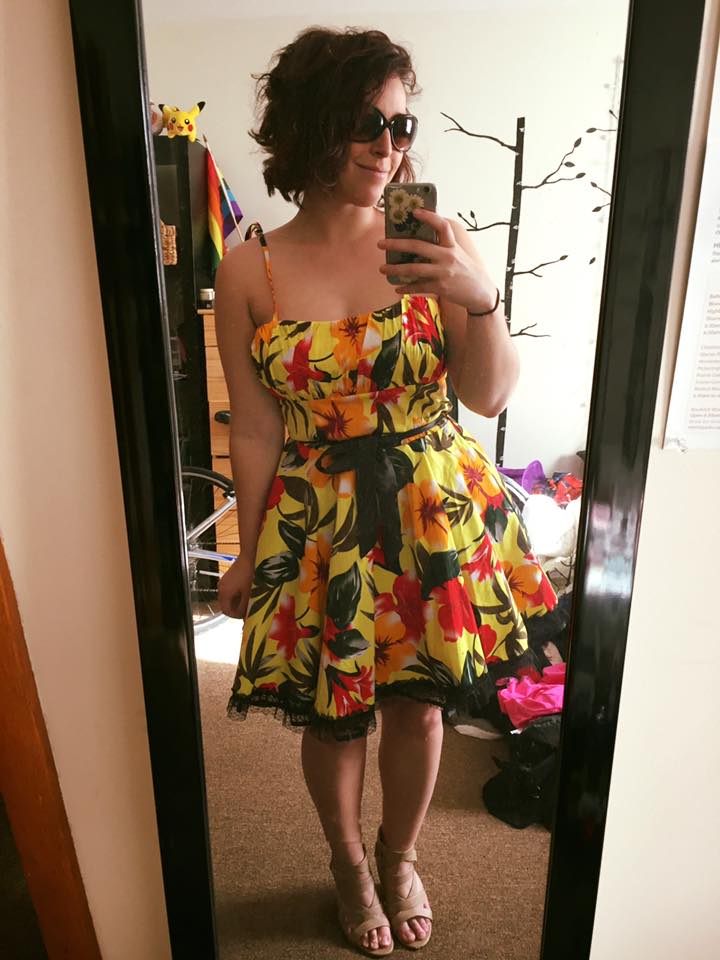When the latest anonymous-message app, Sarahah, was hitting my newsfeed–everyone seemed to have an account–I initially felt that same mixture of revulsion and curiosity that I felt when its previous iterations trended—Ask.fm, Formspring, whatever that Facebook app was ten years ago when there were still Facebook apps. This time I decided to examine the feeling.
I used to say that I don’t participate in these apps because I know that I’d just get unrelenting sexist abuse and then have to wonder which of my alleged “friends” sent it, but this time I realized there’s more than that. There is that, true. You don’t get to be a female blogger for 14 years (that’s more than half my life) without realizing how much of the internet wants to make you feel worthless and small.
But when I’m honest with myself, the compliments feel kind of gross to me, too. All of it feels gross to me. All of it is appealing for some very human reasons–which is why I have no judgment for my friends who choose to take part–but none of it contributes to the type of social interaction I want to have in my life. Even at its friendliest, it impedes direct communication and honesty. It that way, it does the opposite of what it’s supposed to.
Something I’ve noticed during my awkward and at-times painful immersion into Western culture is that white Westerners often view people and relationships in a very acontextual way. They dislike the idea that some actions (such as lying or violence) might be unethical in one context but ethical in another. They dislike the idea that someone might seem one way in one social context, and another way in another. That, to them, feels like dishonesty or “not being true to yourself,” even though that person might experience all of their many facets as equally authentic (or inauthentic, for that matter).
In this view, others’ opinions of you aren’t really supposed to matter–sure, those opinions might hurt or feel good, and they might impede your social/professional/romantic life or enhance it, but the truth of who you are is who you know yourself to be. Others’ feedback can be helpful to you in understanding that, but the context of that feedback isn’t particularly important. That means that the identity of the person giving it isn’t particularly important, either.
I used to see it this way, or tried to, when I used these apps back in high school. If someone sent me an anonymous message saying that I’m ugly and need to change my hairstyle, I would seriously wonder if I should change it–even though that message might’ve come from someone I know to be a bigot. If someone said that I’m arrogant and full of myself, I thought, maybe I am–even though that message might’ve come from a sexist man who thinks that all women are arrogant if they aren’t simpering, apologetic damsels.
With these anonymous message apps, we’re meant to feel bad when someone insults us and to feel good when someone confesses they’ve had a crush on us for years–but for me, nowadays, those things mean absolutely nothing when divorced so entirely from any sort of social context.
Someone out there thinks I’m ugly. Someone thinks I’m their soulmate. Someone thinks I’m not nearly as smart as I apparently think I am. So what? I’m pretty sure I could go through the dictionary, find every adjective that could possibly be applied to a human being, and find someone, somewhere, out of all the thousands of people I’ve interacted with in some way throughout my life, who would describe me using that word.
So what?
I would feel positively gleeful if a sexist man I can’t stand thinks I’m ugly, and I would feel horrified if my boss has been in love with me for years. I would feel devastated if someone I’m interested in thinks I’m ugly, but delighted if they’ve been in love with me for years. (Well, maybe. That’s a bit much. But the point stands.) But when you take identity out of it, these anonymous messages are really just random blips of language floating in a void, totally context-free and mostly meaningless.
But besides the fact that it doesn’t really mean anything, I also think it’s harmful to healthy communication and relationships. To start with the obvious example, if you’re still hanging around on my friends list even though you can’t stand me, that’s not a healthy situation. You should unfriend me. If we are good friends and you’re upset or angry about something I did, and you don’t feel like you can tell me directly, then something’s very broken in our friendship. Either I haven’t created a safe space for my friends to hold me accountable for hurting them, or you have such a negatively distorted view of me that you don’t trust me to accept accountability.
Either way, something is fucked up and messaging me anonymously about it won’t fix it, not least of all because I won’t even know who it is that I’ve hurt!
Likewise, if you want to express that you have a crush on me but you don’t want me to know it’s you, something’s weird. What’s the point of anonymously telling someone you’re interested in them? Obviously nothing can actually happen. They can’t let you know that they’re interested too, and you can’t find out that they don’t think of you that way so that you can start moving on. Sending an anonymous message gives you the illusion of having “done something” about the feeling, except of course you really haven’t—even if you vented to a friend about it, you’d at least be getting some commiseration about it from them. This way, all you’re doing is inflicting some mildly frustrating curiosity on your recipient.
Most people who enjoy using apps like Sarahah enjoy them because of the thoughtful compliments they sometimes receive, often detailed explanations of how the person felt inspired or supported by whoever they’re complimenting. I find these messages really sweet, but I wonder–again–what the point is of sending them anonymously.
If my friends feel inspired or supported by me, of course I want to know, because it feels nice and because I want to keep doing what I’m doing right. But if they don’t tell me who they are, then I can’t connect their praise to any actions on my part. And if they don’t feel comfortable telling me directly, again, I have to wonder why that is.
When I found myself wanting to make a Sarahah account, I realized that what I really wanted was a social landscape in which I can trust people to say what they mean and mean what they say. A landscape in which people (compassionately, if possible) let me know if I’m harming them rather than seething silently about it, and tell me when I make their lives better rather than assuming that I’m confident enough not to care about compliments.
And, sure, it’d be nice if someone I like turned out to have a crush on me. (But in a totally O. Henry-esque twist, my conversations about this with a friend who has similar views about it as I do led us to tell each other that we’re both interested in each other. No anonymous apps needed.)
But Sarahah won’t bring about that kind of trust and openness. If anything, it’ll only harm it further.
The more I thought about it, the more uncomfortable I was with the ways in which Sarahah weaved itself through my newsfeed. It was like the junior high cafeteria all over again, but digitally. Folks would post screenshots of anonymous crush confessions, inviting the sender to “let me know who you are! ;)” as friends tried to guess their identity in the comments. They’d post criticism, too—fair and unfair—and their friends would fill up the comments with furious denunciations of the anonymous critic and how they “have no idea what they’re talking about, you’re one of the kindest people I know.”
It seemed less about “feedback” and more about connecting with the (non-anonymous) people responding to it, which I suppose isn’t surprising—like I said, anonymous messages don’t really facilitate any actual connection.
After grappling for a while with the question of whether or not to make an account, I ended up sharing some of these thoughts on Facebook and inviting my friends to reach out directly if they had anything to say to me. A few did.
But the best thing—the only thing, really—that I can do to create the types of social interactions I want is to model them myself and to continue showing myself to be the type of person that others can safely give feedback to. And that is maddeningly difficult and slow-paced, and I don’t blame anyone for reaching for anything that seems like a shortcut.
Brute Reason does not host comments–here’s why.
If you liked this post, please consider supporting me on Patreon!






